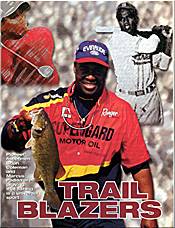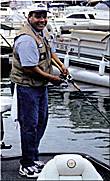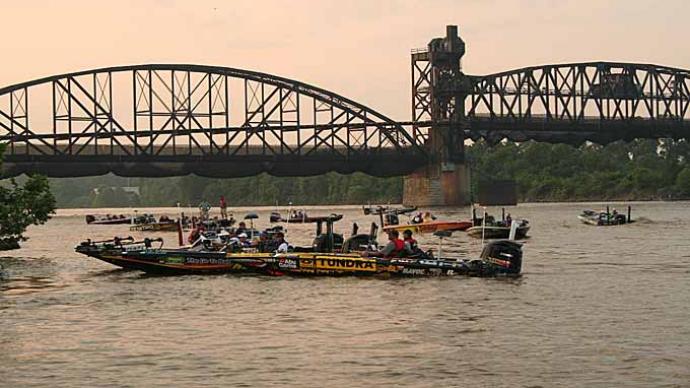
As much as Brian Coleman might enjoy thinking of himself as a Jackie Robinson type of figure in competitive bass fishing, his honesty will not allow him to cloud the facts. Coleman, who is black, remembers hearing racial insults and hateful jeering from opposing dugouts when he played baseball for perennial powerhouse Arizona State University. And he knows of the legacy Robinson left when he broke baseball's color barrier with the Brooklyn Dodgers in the 1950s. This is the year 2000, and while he is still one of only a handful of minority fishermen who compete in bass tournaments, he sees no similarities between what he faced as a Sun Devil or what Robinson faced in the big leagues.
"I'm here to tell you there has not been one incident (of racially-motivated negativism)," he says. "I've talked to others, and nobody has ever told me of being mistreated at a tournament." That is welcome news for tournament organizers and sponsors who see minority fishermen as a tremendous untapped market and one of the surest bets to continuing the growth of their sport, which has penetrated the mainstream barrier with remarkable momentum over the past decade. A live broadcast of a weigh-in at the Ranger MI Millennium, Wal-Mart's involvement in the FLW Tour, and that circuit's exposure on ESPN have been milestones. Yet, by and large, minorities have not sought the big dollars that are now associated with professional fishing.
Fishing is a universal language that breaks down barriers and brings people together.
"The magnificent thing about fishing is its accessibility to everyone. Anybody with a desire to participate can. People of all races, occupations, and abilities can enjoy the sport. There are no physical prerequisites," he says.
Still, that message of inclusion has not reached many minority angling enthusiasts.
"There is a perception among minorities that they haven't been wanted out there," Coleman said. "When I hear that, I tell guys, 'You just need to come out and get to know these guys.' Some people think it's still the 1950s or something.
"I was at the weigh-in at the FLW tournament in Mississippi, and many African Americans spoke to me and wanted to know about any mistreatment I had to endure. I told them they needed to be more informed about how things were out here. The other fishermen have been great to me. I've come to know many of these guys, who are my friends now."

Coleman has yet to pay attention to negative stereotypes. He admits to having heard many of his black friends discuss their feelings that prejudice exists in tournament fishing. But Coleman enthusiastically accepted when his close friend Gerald Perry - who is white - asked him to fish a buddy tournament some seven years ago. Although he lost four fish that may have cost his tandem first place, the family atmosphere, competition, and joy of fishing ignited Coleman's fishing career.
Today, Coleman, who has had moderate success fishing the Co-Angler Division of the FLW Tour and competes in the Red Man Tournament Trail's Hoosier Division, works as the fishing expert for E-mazing.com. He has attracted an impressive list of sponsors, including such jewels as Ranger Boats and Evinrude Outboards. He also is a member of the CITGO fishing team.
"When we put together our team, we didn't worry about race or gender," says Don Rucks, the man responsible for assembling the CITGO squad, including a Cherokee Native American and a woman. "We're a pretty diverse group. One of the things we like about the sport is that it crosses all those lines. Anybody can do it.
"We have Brian on the team because of the way he handles himself. I thought Brian presented himself well when he came to us. He was very professional."
Coleman says being professional is the key to attracting sponsors; more than just filling a demographic hole is needed. And, because of the small number of minorities represented, those fortunate enough to obtain sponsorships should be prepared to put forth a greater effort to be visible.
"The way I go about attracting sponsors is different from a lot of guys in that I let them know that I will truly promote their products," says Coleman, who studied accounting and marketing at ASU. "Some guys think their job is to go fishing, but I will do whatever I can to sell more of my sponsors' products. I'm available for boat shows, trade shows, whatever I need to do."
Sponsorships have not flowed as easily to Marcus Padilla thus far, but he has only competed in two FLW events and has already caught the interest of some companies. Padilla, who left Honduras in 1981 and proudly announces his recently obtained United States citizenship, bills himself as "The Latino Fisherman." While Coleman is joined by black anglers Willie White and pro-Clifton Blanchard, Padilla is the sole flag bearer on the circuit for Latinos.
His fishing career began before he knew what a paycheck was - never mind that one could get paid for fishing. His grandfather and father taught Padilla to fish and hunt to survive in their farming village. Fortunately, the pressure of catching fish to keep from going hungry did not taint the joy of the sport for a young Padilla.
"It was like the Garden of Eden," he remembers of his homeland. "My father and grandfather got me hooked on fishing. It was just a way of life for us, and I loved it."
Still, the lack of professional opportunity caused Padilla to set up his sites in the United States. He said his father proudly emptied the family savings of about $75 to help his son begin his quest. After a tearful goodbye, he was off to the Land of Opportunity.
Today, when he's not fishing, Padilla works for a courier service near his Hightstown, N.J., home. He drives long hours, delivering computers and other business equipment. He also coaches youth soccer. He and his wife of 15 years, Barbara, have two children - daughter Corey and son Christian. Padilla lives the American dream that many others in his native country can only dream about. Tournament fishing represents a dream of yet a different kind.
"For the longest time, I didn't even realize there were opportunities for Latinos," he said. "Nobody ever explained it to us. We didn't know we were allowed to fish in tournaments. Then, finally, I talked to some people who told me anyone could fish in tournaments, so I fished in them, too."
| There's a perception among minorities that they haven't been wanted out there. So when I hear that, I tell guys, 'You just need to come out and get to know these guys.' |
Padilla has put his outgoing personality to work for him, making friends with some of fishing's top names, such as Larry Nixon, Denny Brauer, Paul Elias, and his idol, Roland Martin. He soaks up information like a sponge. If there is a tip to be told, he is willing to hear it. Although he earned a check with a 72nd-place finish in his first-ever FLW tournament, he has yet to have much financial success in competitive fishing. However, Padilla says he isn't concerned with that.
"I think I'll win someday, but that is not so important," he says. "My dream has already come true by meeting all of these guys, even if I never win a tournament. What happened (upon fishing in his first tournament) was one of the most beautiful things. The fishermen out here treated me so great and accepted my being here. I feel like these guys are my family."
Like Coleman, Padilla encourages minority anglers to ignore any preconceptions they may hold and fish in tournaments. Both men have made a habit of breaking barriers. Padilla has developed strong bonds with many of the nearby ice fishermen in his hometown despite fishing in an environment far removed from his earlier tropical surroundings. Coleman and his wife Tonya and 3-year-old daughter Kelsey are one of only two African American families who attend the Westport Road Church of Christ and are the only black family in their Mount Washington, Ky., neighborhood. Both men proudly wear the mantle of role models, and each hopes to accomplish more than catching fish when they compete.
Padilla has put out a video that offers instructional tips and encouragement to Latinos with strong cultural ties to fishing to compete in local and national tournaments.
Coleman says that his daughter inspires him to deviate from the norm. "I think it's great that I can show her that she can do whatever she wants," he says. "I'm proud to send her that message."
Content provided by Bass Fishing Magazine, the official publication of FLW Outdoors

